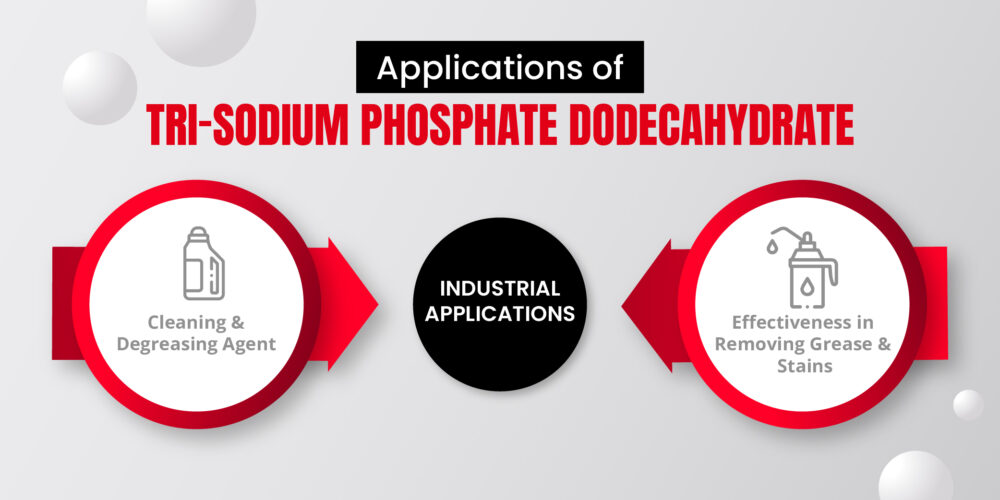Exploring the Applications and Benefits of Tri-Sodium Phosphate Dodecahydrate in Industry - Annexe Chem Pvt Ltd
Exploring the Applications and Benefits of Tri-Sodium Phosphate Dodecahydrate in Industry

- August 20, 2024
- By Akshita Patel
When it comes to versatile chemical compounds, Tri-Sodium Phosphate Dodecahydrate (TSP Dodecahydrate) stands out as a powerhouse across various industries. From its role as a potent cleaning agent to its application as a food additive, this compound has earned its place in both industrial and household settings. But what exactly makes TSP Dodecahydrate so effective, and why is it trusted by professionals around the globe? In this blog, we’ll dive into the unique properties, diverse applications, and safety considerations of Tri-Sodium Phosphate Dodecahydrate, exploring why it’s an essential component in everything from your kitchen pantry to industrial manufacturing processes.
Chemical Formula and Molecular Structure Of Tri-Sodium Phosphate Dodecahydrate
Tri-sodium phosphate dodecahydrate, commonly known as TSP Dodecahydrate, has the chemical formula Na₃PO₄·12H₂O. This formula indicates that each molecule contains three sodium (Na) ions, one phosphate (PO₄) ion, and twelve water molecules (H₂O) of hydration. The presence of these twelve water molecules classifies it as a dodecahydrate, giving it distinct properties compared to its anhydrous or lower hydration counterparts. The molecular structure is composed of sodium cations and phosphate anions, creating a highly soluble and alkaline compound.
Physical Properties Of Tri-Sodium Phosphate Dodecahydrate
In its solid form, TSP Dodecahydrate appears as colorless, crystalline granules or powder. It is highly soluble in water, dissolving easily to create a strongly alkaline solution with a pH typically ranging between 11 and 12. This high solubility makes it an effective agent in applications that require rapid dispersion in water. Stability-wise, TSP Dodecahydrate is stable under normal conditions but may lose its water of hydration when exposed to high temperatures, leading to a conversion to anhydrous sodium phosphate. It is also non-flammable and does not pose a risk of combustion.

Applications Of Tri-Sodium Phosphate Dodecahydrate
Industrial Applications Of Tri-Sodium Phosphate Dodecahydrate
Tri-Sodium Phosphate Dodecahydrate (TSP Dodecahydrate) is a versatile compound with a wide range of industrial applications. Its unique chemical properties make it an essential ingredient in sectors such as cleaning, food processing, and water treatment.
- Cleaning and Degreasing Agent: TSP Dodecahydrate is renowned for its powerful cleaning and degreasing capabilities. As an active ingredient in both household and industrial cleaners, it effectively breaks down and removes stubborn grease, oil, and grime from surfaces. Whether it’s for cleaning kitchen appliances, floors, or industrial equipment, TSP Dodecahydrate delivers results by emulsifying fats and oils, making them easier to wash away.
- Effectiveness in Removing Grease and Stains: One of the primary reasons TSP Dodecahydrate is favored as a cleaning agent is its high alkalinity, which enhances its ability to tackle tough stains. When mixed with water, it forms a strong alkaline solution that not only cuts through grease but also helps in lifting away dirt, making it a preferred choice for pre-paint surface preparation and other heavy-duty cleaning tasks. This effectiveness extends to a variety of surfaces, including metal, concrete, and even some types of fabric, ensuring a thorough cleaning every time.
Usage Of Tri-Sodium Phosphate Dodecahydrate in Food Processing
In the food industry, Tri-Sodium Phosphate Dodecahydrate plays a crucial role as an emulsifier and pH adjuster. Its ability to stabilize mixtures of oil and water makes it a valuable additive in processed foods like cheese, dairy products, and baked goods. By preventing the separation of ingredients, TSP Dodecahydrate ensures a consistent texture and quality in the final product.
Additionally, TSP Dodecahydrate is used to control the acidity of food products, ensuring that they remain within the desired pH range for flavor, preservation, and safety. This pH adjustment capability is particularly important in the production of meat products, beverages, and other processed foods where specific pH levels are critical to the product’s stability and taste.
The use of TSP Dodecahydrate as a food additive is regulated by authorities like the U.S. Food and Drug Administration (FDA) and the European Food Safety Authority (EFSA). It is Generally Recognized As Safe (GRAS) when used by prescribed limits. However, food manufacturers must adhere to these guidelines to avoid excessive consumption, which could lead to adverse health effects. Proper labeling and adherence to food safety regulations ensure that products containing TSP Dodecahydrate are safe for consumer use.
Usage Of Tri-Sodium Phosphate Dodecahydrate in Water Treatment
- Water Softening and Prevention of Corrosion: In the realm of water treatment, TSP Dodecahydrate is utilized for its water-softening properties and its ability to prevent corrosion in pipes and water systems. By binding with calcium and magnesium ions, TSP Dodecahydrate effectively reduces water hardness, which can cause scaling and build-up in plumbing systems. This not only extends the lifespan of water-using appliances but also improves the efficiency of detergents and soaps used with softened water. Additionally, TSP Dodecahydrate helps in inhibiting corrosion by forming a protective layer on metal surfaces, which prevents the oxidative reactions that lead to rust and degradation. This is particularly beneficial in industrial water systems, where the longevity and integrity of the infrastructure are critical.
- Impact on Water Quality and Infrastructure Longevity: The application of TSP Dodecahydrate in water treatment has a significant impact on both water quality and infrastructure longevity. By mitigating the effects of hard water and preventing corrosion, it ensures that water systems operate more efficiently and with fewer maintenance issues. This contributes to the overall sustainability and cost-effectiveness of water management practices in both residential and industrial settings.
Health and Safety Considerations Of Tri-Sodium Phosphate Dodecahydrate
- Potential Health Risks and Safety Measures: TSP Dodecahydrate is generally safe but can cause skin and respiratory irritation if mishandled. Wearing protective gear like gloves and masks, along with proper ventilation, minimizes exposure risks.
- Guidelines for Handling and Storage: Store TSP Dodecahydrate in a cool, dry place, away from strong acids. Keep containers sealed to prevent moisture absorption. Always follow safety data sheets (SDS) and manufacturer guidelines for safe handling.
- Environmental Impact and Disposal Methods: While TSP Dodecahydrate has a low environmental impact, improper disposal can lead to water pollution. Follow local disposal regulations and avoid releasing it into waterways to minimize ecological risks.
Innovative Uses and Research Related To TSP Dodecahydrate
TSP Dodecahydrate is finding new applications beyond traditional uses. In industries like biotechnology and electronics, its potential in processes such as protein purification and circuit board cleaning is being explored, showcasing its versatility.
Current Research Trends and Potential Future Developments: Ongoing research is investigating TSP Dodecahydrate’s role in sustainable practices, including eco-friendly cleaning solutions and water treatment methods. Scientists are also exploring its potential to enhance food preservation and improve industrial efficiency, paving the way for future advancements.
Recent case studies highlight innovative uses of TSP Dodecahydrate in areas like 3D printing and advanced manufacturing, where its properties enhance material performance and process efficiency. These examples illustrate the compound’s expanding role in cutting-edge technologies.
Tri-Sodium Phosphate Dodecahydrate is a versatile and indispensable compound with applications spanning from household cleaning to advanced industrial processes. Its unique chemical properties make it a powerful agent in cleaning, food processing, and water treatment, while ongoing research continues to unlock new and innovative uses. However, with its widespread use comes the responsibility of handling it safely and considering its environmental impact. As industries evolve and demand for efficient, multi-functional compounds grows, TSP Dodecahydrate’s role will likely expand further, solidifying its place as a key player in various fields.
Whether you’re a professional in the industry or simply curious about the science behind everyday products, understanding TSP Dodecahydrate offers valuable insights into its critical role in modern life.

Akshita Patel
As an advocate for sustainability, Akshita is committed to driving positive change within the chemical industry. She actively seeks out environmentally friendly solutions and promotes the adoption of sustainable practices. Akshita believes that a balance between economic growth and ecological responsibility is crucial for the industry's long-term success. She is dedicated to finding innovative ways to minimize environmental impact while maximizing efficiency and profitability.
Related Blogs

- March 15, 2025
- By Akshita Patel
Mono Potassium Phosphate Explained: Properties, Applications.
What if a single compound could revolutionize plant growth, enhance food preservation, and even improve industrial.

- December 23, 2024
- By Akshita Patel
What is Potassium Carbonate? A Comprehensive.
Did you know that a single compound can shape the glass in your windows, soften the.



